- Home
- Barry Unsworth
The Quality of Mercy: A Novel Page 3
The Quality of Mercy: A Novel Read online
Page 3
“This was in the early hours of the morning. By the time it was discovered the man would have been well clear of the prison, and there was no way of knowing which road he had taken. Sir, there are not officers enough in London to conduct a search of that kind.”
A short laugh broke from Kemp, though his face showed no change. “I cross the Atlantic to bring these men to justice. I spend weeks in Florida, enrolling the force of troops I shall need. I spend further weeks discovering the whereabouts of the miscreants and tracking them down. All this at great expense and to the neglect of my business. And now this wretch strolls out of prison, and no one thinks any more of it till next day, several hours later.”
“That seems to be the case, yes.”
“I shall lodge a complaint. I shall see that those responsible are dismissed. You will understand my displeasure, sir. I have related the circumstances in which my father’s ship was lost.”
The lawyer nodded. Even without this relation he would have known a great deal of the case. The impending trial was complicated; in fact, there would be two hearings, one civil, the second criminal. It had aroused considerable interest in legal circles, and the London newspapers had all contained accounts of it, embellished by a good deal of gossip. Kemp’s career had become public property in the course of the last two weeks, described in detail: the obscure beginnings in Liverpool, son of a bankrupt cotton merchant; the marrying into money in the person of Sir Hugo Jarrold’s daughter, an unhappy match by all accounts. Then the fortune made in sugar, the partnership in his father-in-law’s bank—he was head of the bank now, the old man never appeared in public, it was thought that his mind had gone. Kemp had returned from Florida to news of his wife’s death.
“I swore I would see them all hanged,” Kemp said. “The loss of ship and cargo ruined my father. And now one of them walks free, as if he had done no more than raid a chicken house.”
“Well, he could be hanged for that, as the times go,” Pike said. He remained silent for some moments, regarding the man opposite him. The bitterness of these last words had brought Kemp forward in his chair. He had raised his hands in speaking, causing pale ripples of reflection on the polished ebony surface of the desk at which he was sitting. He had a habit of occasional rapid gesture unusual among English people, at odds with that slight stiffness of bearing. The darkness of his eyes and hair and the olive tint of his complexion, these too were unusual. He was dressed with sober elegance in clothes that were fashionable but not ostentatiously so: a solitaire in the cravat, coat of dark blue velvet, cut away at the front to show a white silk waistcoat, unembroidered, buttoned in the new style, all the way down to the hem; he wore no wig and no powder on the hair, which was tied behind with a single ribbon. It was the dress of a man who gave a great deal of thought to the figure he made.
“They will hang, be assured of it,” the lawyer said. “They killed the captain, but that was in the course of a scuffle, confused in its nature—it might be difficult to establish responsibility. No, it is the sailing off with the cargo of negroes that will be viewed more seriously, as constituting piracy, an aggravated form of theft, an outrage against property. There is no country in Europe where a man or woman or child, especially of the poorer classes, is more likely to be hanged for offenses against property than this great country of ours. According to Blackstone’s Commentaries, that are presently being published, there are in this year of grace 1767 no fewer than one hundred and sixty capital statutes, an increase of a hundred since the beginning of the century. And they are growing day by day. Murder, rape, maliciously cutting hop binds, destroying the heads of fishponds, waging war against the king in his realm—all are equally likely to get you standing room on the cart to Tyburn. In theory, at least. Whether juries will convict on a lesser charge is another matter, of course.”
“It is their duty to convict if that is the law,” Kemp said. He was largely in favor of severe punishments, and had not liked the other’s lightness of tone. Belonging as Pike did to a trade that could only profit from this proliferation of capital offenses, such levity seemed like ingratitude. “It deters people from committing felonies,” he said. “It nurtures respect for our institutions, which I believe are the envy of the world.”
Pike had sensed this disapproval, understood it, felt a certain contempt for it. Not much humor there, not much play of mind. He himself had plenty of both—too much, some of his colleagues thought. “We need to make jokes about the law, sir,” he said. “It belongs to the profession. Like the doctors, you know. Who better fitted than they to make jokes about sickness?”
He paused on this with a certain sense of constraint, recalling only now that Kemp’s cousin, a man named Matthew Paris, had been the doctor on the ship, had taken part in the mutiny, in fact had played a leading role in it, had been wounded when the people of the settlement were captured and had died of the wound. The embarrassment was needless, however; his remark had been so foreign to Kemp’s way of viewing the world that he had failed altogether to understand it, and so made no reply, obliging the lawyer to speak again, before the silence could become oppressive. He could not leave yet; there were things still to be imparted to this difficult client of his. “Well,” he said, “it deters those who are hanged, there is no smallest doubt of that. And of course it is an encouraging mark of our national prosperity.”
Kemp stared. “How do you intend that remark?”
“Sir, this vast increase in the application of the death penalty has coincided with a notable influx of wealth through growth in our manufactures and maritime commerce. To put the matter simply, there is constantly more capital circulating in the country, and therefore constantly more property to protect. Property is the thing, sir, not the life of the subject. Let me give you an example. Not so long ago, the servant of a gentleman in Taunton, possessed of some grudge, attacked his master with a carving knife, wounding him in a dozen places. He did not die, being blessed with a strong constitution, but he came very close to it. Well, the man was hanged, of course, but you will not easily divine why.”
“Why, for attempted murder, I suppose.”
“No, sir. The law we serve with such devotion is not always so simple. They hanged him for attempted burglary. In order to gain access to his master, he had to enter by the door that led to his master’s chamber. There was no forcing of locks—all he did was lift the latch and go in.”
Kemp regarded the lawyer for some moments without speaking. The instinctive antagonism of his nature, a constitutional unwillingness to react as was expected or desired, unless there was something to be gained, kept his face impassive now. Pike was acting for him, they had agreed on a fee; he saw no cause for seeking to please Pike by raising eyebrows or uttering exclamations of astonishment. “So long as he was hanged,” he said, “that answers the matter well enough.”
“Some might take that view, yes. I have been wondering … If you wanted the men hanged, the remainder of the crew, I mean, why not see to the business in Florida? It is a British possession by exchange of Havana with the Spanish. The Admiralty has jurisdiction there, no whit less than here in London. And procedures are simpler in the colonies. They could have been hauled off and hanged from one day to the next.”
Kemp hesitated before replying; in fact, at first he was minded not to reply at all. He had never, from earliest youth, liked to avow his motives for anything, feeling it to be somehow undignified, or even demeaning, as if he were submitting himself to judgment. His cousin had been wounded in the capture and had died of the wound before he could be got to the hangman in Florida or anywhere else. Kemp had felt this keenly at the time as a failure on his own part. His view of it had changed since then; the failure was tinged with sorrow now, though he could not bring himself to admit blame or contrition—that would be to betray the mission of justice that had impelled him. He had been guided by principle in bringing the men back to England, and he was a man who set great store by principle.
“That was my first
thought,” he said. “But then it seemed wrong to have them tried and executed in that hasty, scrambling sort of fashion. Twelve years had passed since they took refuge in Florida. I judged it more in keeping that they should stand trial and be hanged here, in full public view, so they should serve as an example of the workings of justice, and make it known on every hand that punishment is certain, whatever the time that has elapsed.”
It was Pike’s turn to hesitate now. He was not cynical exactly, but he had seen too many courtrooms to believe altogether in the principle of justice as a determining force in legal process. “Worthy aims, worthy aims, upon my soul,” he said at last.
“Have there been some further developments? Other than the escape of this scoundrely fiddler, I mean. Is it not high time that these men came before a jury?”
“We have been successful in our application for the release from prison of the first mate, Barton. As you know, he is turning evidence against the others on the promise of a pardon. His evidence cannot be presented in court while he is in confinement, since it might seem that his words are aimed at securing his own release.” Here the lawyer permitted himself a pause and a smile, though he made no attempt to share the smile with his client. “That his words will have already served to secure his release is an entirely different matter, of course. He has undertaken to make a written deposition. It seems that he can write.”
“Yes, he told me he could read and write.” With the words there came to Kemp a memory of the mate as he had been aboard ship, when the proposition to betray his shipmates had first been put to him. In the narrow confines of the cabin, Barton, brought down from the open deck, had shivered like a dog and gulped down the rum and talked of his sainted mother, who had taught him to read at her knee. A reek of sweat and fish oil had come from the man’s body as he sat across the table. They had used the oil against mosquitos in that land of swamp and lagoon. Kemp’s nostrils contracted involuntarily at the memory. Barton had been naked above the waist except for a scrap of red silk round his neck, and this degraded dandyism had stayed with Kemp as somehow marking the mate’s readiness to preserve himself, to serve new masters. How glad he had been to get this evidence against his cousin. Any instrument, however base, however loathsome. Matthew had still been alive then …
“That is all satisfactory,” the lawyer said. “But this case has aroused widespread attention, and I have learned something this morning that might complicate matters and make it more difficult to get a speedy judgment.”
“What is that?”
“Frederick Ashton and some others of similar persuasion have taken the case up.”
The name, coming thus unexpectedly, caught Kemp off guard, and he glanced aside, a thing unusual with him. He had recently met, and exchanged some words with, this man’s sister, Miss Jane Ashton, at the house of a business acquaintance, and her face came vividly to his mind now, the eyes particularly, between gray and green in color and very direct and unfaltering. She had looked at him without coquetry, without any care to challenge or provoke, though some hint of laughter there had been. No other young woman had regarded him so frankly, none that he could remember. He had felt a need to break that scrutiny, and he had found a way of doing this by paying her a compliment on her gown. At this she had smiled and glanced slightly away, and this had seemed to him like something won from her. A smile of good augury, as he thought of it now: not five minutes afterward his host had told him in private talk that a Lord Spenton, a mine owner, desired to obtain a loan from the bank, thus presenting the kind of investment opportunity that he had long hoped for.
The lawyer had noticed his hesitation and misunderstood it. “You know the man?”
“We have not met, but I know him by repute.”
“So far he has confined his activities to contesting the right of property in slaves brought to these shores from the West Indies, using the argument that England is the home of freedom and that her laws cannot tolerate one man claiming ownership in another.”
“That is all very well,” Kemp said. “But they don’t understand the workings of money, these people. There might be a hundred blacks brought here in the course of a year, all acquired by purchase. Then there are the numbers already here, probably at least a thousand in London alone. It amounts to a very considerable capital sum. Who is going to compensate the owners?”
“That is a question that causes alarm on all sides,” Pike said. “Of course, if they were declared to be free upon setting foot on English soil, their owners would be obliged to desist from bringing them here.”
“But that would be an unwarranted curtailing of our essential liberties as Englishmen.”
The lawyer’s own habit of mind caused him to suspect that there might be some intention of irony in these words, but his client’s face had remained completely serious. “Well,” he said, “it seems that Ashton is now looking further afield—he is intending to use the case for his own purposes. He has already engaged counsel to defend these men, an unusual step in itself, since they are quite penniless. His lawyers have petitioned for a postponement to allow them to seek material for the defense.”
“Defense? What defense can there possibly be? It is perfectly obvious that the men are guilty.”
“A defense of some kind can always be mounted. But certainly it is difficult to see what line Ashton intends to take. They have no independent witness to call into court. All those on board the ship at the time of the mutiny have either died since, or been resold into slavery in Carolina, or are lying in Newgate Prison facing capital charges. With the exception of our friend Barton, that is, and this Irish fiddler. I suspect Ashton will try to make a single action of it and force a decision on the issue of property.”
“But it is one single action, surely.”
“No, sir, you naturally see it in that light because you think of the felonies that were committed, the murder of the captain, the theft of ship and cargo, the clear intention not to return. But there is an action prior to this one. The mutiny can be said to have begun, and so we shall plead, when your cousin raised his hand against the throwing overboard of the sick negroes, still alive as they were. We shall have Barton’s testimony to support us in this. Now there is no question of felony up to this point, none at all. The slaves were cast into the sea in order to claim the insurance on them.”
“Lawful jettison,” Kemp said. “There was a shortage of water—barely enough for the crew. Barton will testify to that also. I am fully entitled to the insurance money, every penny of it, as owner of the ship through my father.”
“Quite so, sir, we are in complete accord. But the insurers are contesting the claim, as you know; they will say the jettisoning was not lawful, they will say there was water enough. Now it is in our interest to keep these two actions entirely separate, and seek to have the question of insurance settled in the Court of Common Pleas, not at the Old Bailey, where it might become confused with the criminal charges. We cannot know for the time being what line the defense will take, but I am supposing they will seek to have our arguments of lawful jettison absorbed into what they will see as the essential issue, which is that the jettison would have been unlawful, and even criminal, under any circumstances.”
“How can that be? It makes no sense.”
“Well, I think they will maintain that it is a crime under any circumstances to throw living persons over the deck of a ship on the only grounds that they are sick and like to die.”
“It is a contagion of madness,” Kemp said. “We are talking about the ship’s cargo. The negroes were acquired by lawful purchase on the Windward Coast of Africa. They were to have been sold at Kingston slave market in accordance with established practice. How can they be regarded as other than cargo?”
He had the sensation, frequent with him since his return, of arguing with himself, or with some shadowy person not quite himself, someone whom he urgently needed to convince but who constantly framed arguments more weighty than his own. For twelve years, in that w
ilderness, they had lived free, black and white together. Free but not equal: there must have been struggles for power and precedence among them, this was a natural feature of any human society. But the inequalities, whatever they were, would not have depended on color or race. And the people had lived in understanding of this; they had shared the women, they had shared the parentage of the children …
“It is madness,” he said again.
“Entirely so, sir, we see eye to eye on the matter. But the law has to deal with divergent interests.” The lawyer brought his palms together, then slowly moved them apart. “The law has to stretch, sir,” he said. “They will maintain that it was murder.”
“Killing the ship’s captain when he was about the lawful exercise of his duties, that is not murder, I suppose?”
“They might claim, they will claim, that it was justified as preventing the numerous murders that might have followed.” With this Pike rose to his feet. “I will not occupy your time any further,” he said. “I judged it needful that you should know of these developments.” He stood for a moment longer, smiling at Kemp, who had also risen. “Have no fear,” he said. “We shall prevail. Property is the key to the business. If they fight us on property, they are bound to lose. The Lord Commissioners appointed by the Admiralty will have a high regard for property. We must hope for a judge with good understanding, someone with holdings in the West Indies, or at any rate with a stake in the trade.”
When Pike had gone Kemp returned to his desk and remained there for a time that passed blankly, without his noting it. Then he rose and went to his window and looked down for some moments through the thick distorting glass at the blur of the traffic below. When he turned back toward the room, it was for a brief while as though everything in it were strange to him. As if seen for the first time, the framed watercolors, the ledgers and the account books on their shelves, the broad table with its silver-mounted inkstand and its japanned tray, where lay his paperknife with the mother-of-pearl handle, and his seals, and his ivory paperweight in the form of a Moor’s head.

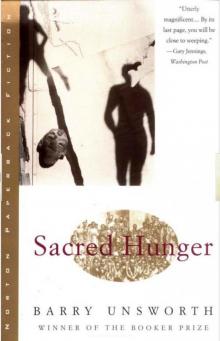 Sacred Hunger
Sacred Hunger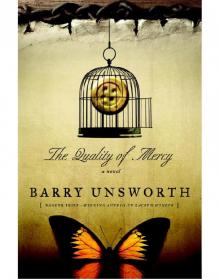 The Quality of Mercy: A Novel
The Quality of Mercy: A Novel The Songs of the Kings: A Novel
The Songs of the Kings: A Novel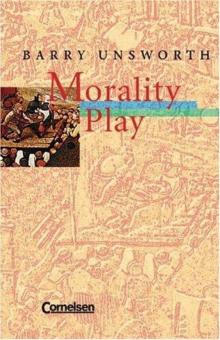 Morality Play. Mit Materialien. (Lernmaterialien)
Morality Play. Mit Materialien. (Lernmaterialien)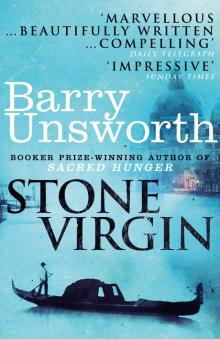 Stone Virgin
Stone Virgin Land of Marvels
Land of Marvels Mooncranker's Gift
Mooncranker's Gift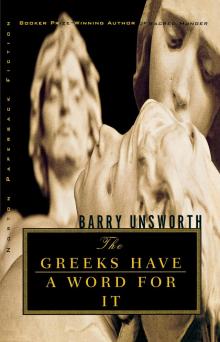 The Greeks Have a Word for It
The Greeks Have a Word for It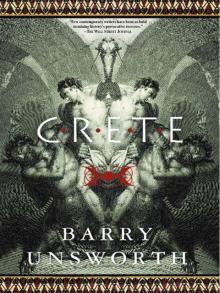 Crete
Crete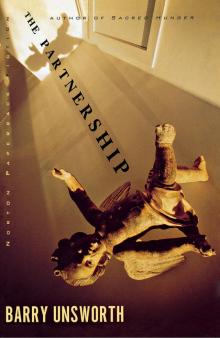 The Partnership
The Partnership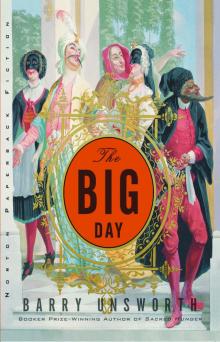 The Big Day
The Big Day The Hide
The Hide Losing Nelson
Losing Nelson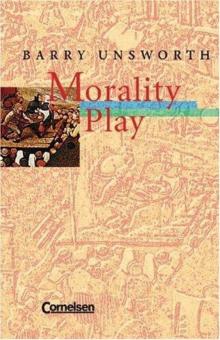 Morality Play
Morality Play Land of Marvels: A Novel
Land of Marvels: A Novel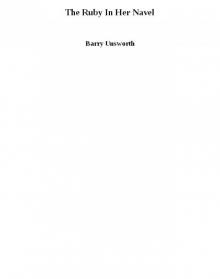 The Ruby In Her Navel
The Ruby In Her Navel